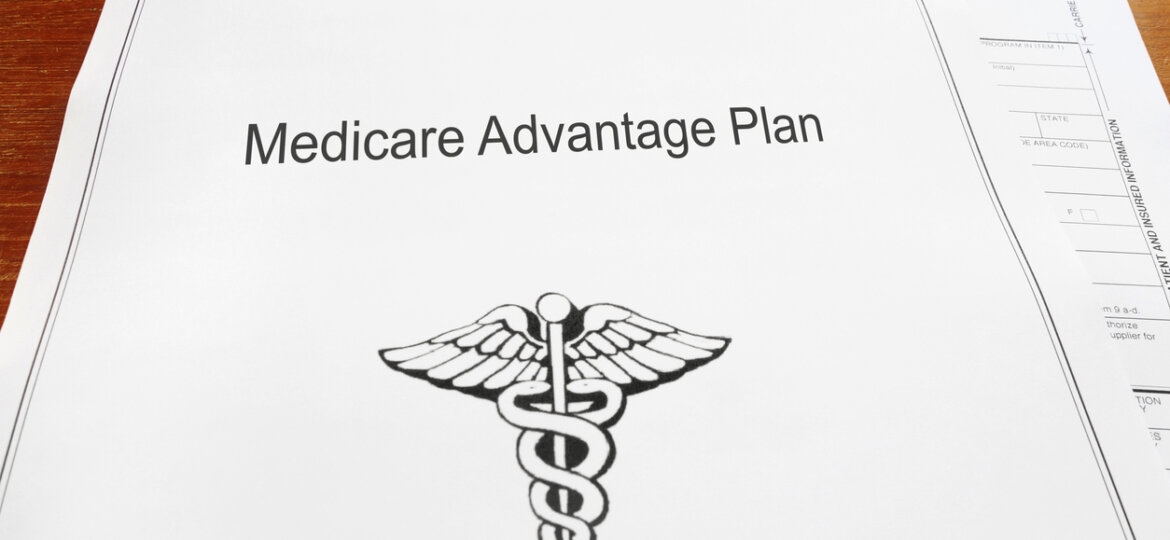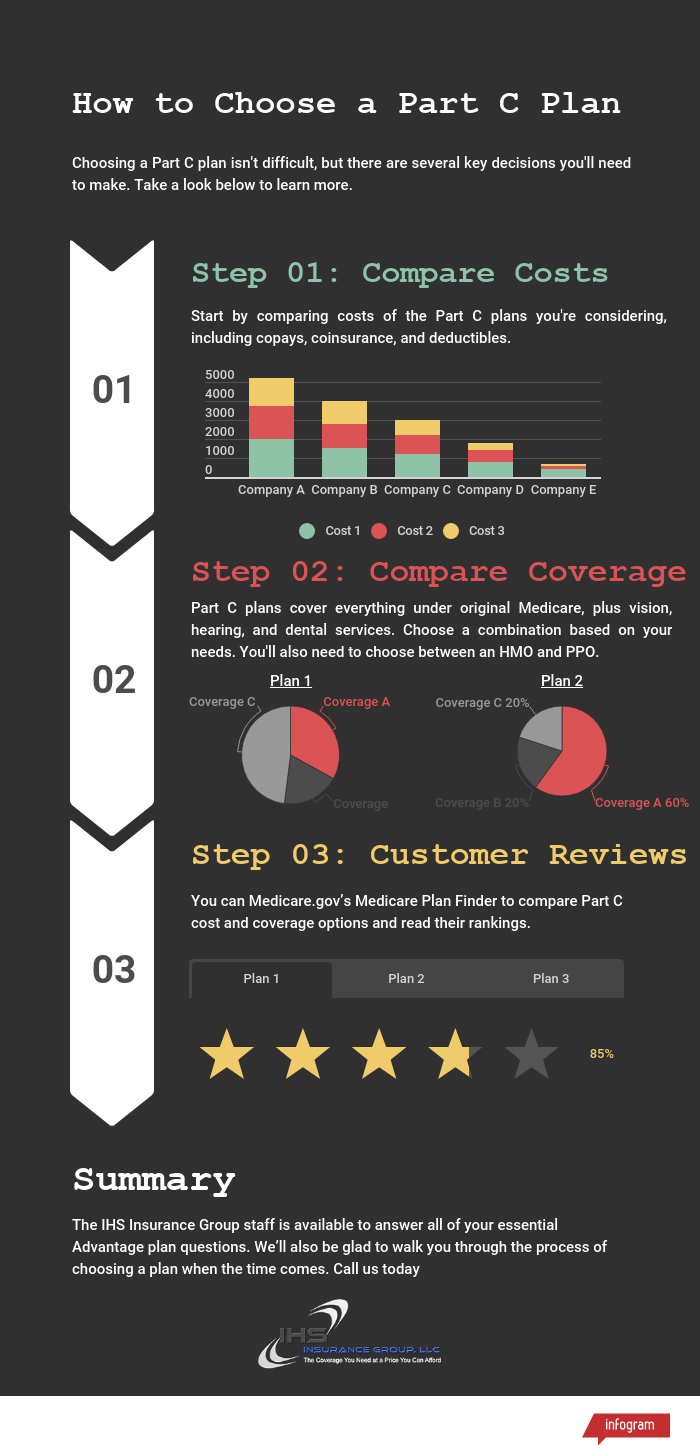
Deciding Which Part C Plan is Right for You
Just like choosing any other form of insurance, selecting the right Medicare Advantage plan will largely depend on your specific combination of needs and preferences.
Still, there are three main factors you should keep in mind while shopping that can help make the process easier and less stressful, and leave you with a more informed choice. That’s precisely what the team at IHS Insurance Group will outline in this article.
Before diving in, though, let’s discuss a few essential details about Medicare Part C plans.
Quick Basics About Medicare Advantage (Part C) Plans
Administered by the US federal government, ‘Original’ Medicare consists of two main sections: Part A, Hospital Insurance, which pays for services like inpatient care and home health care, and Part B, which covers outpatient care and durable medical equipment. Enrollees can receive services from any health professionals in the US who participate in the Medicare program.
Comparatively, Advantage, or Part C, plans provide all of the same coverage offered under Original Medicare but are administered by third-party insurance companies. Coverage is generally delivered by networks of Health Maintenance Organizations (HMO) or Preferred Provider Organizations (PPO), and enrollees might have to pay out-of-pocket if they receive services from out-of-network providers.
For more about how Medicare Advantage plans work, be sure to read our in-depth article, Medicare Part C Coverage Basics.
With these critical details in mind, let’s dive into the nitty-gritty details.
Choosing an Advantage Plan, Step 1: Compare Costs
In general, Medicare Advantage plan premiums are lower than Original Medicare. Furthermore, Part C plans also typically feature lower (or included) cost-sharing and yearly out-of-pocket costs, which means that once you hit your limit, you won’t pay for covered services until your term renews the following year.
“Don’t look solely at premiums,” though, Nerdwallet advises. Also, you’ll want to factor in costs like “copays, coinsurance, and the deductible. Often, a high deductible is the trade-off for a lower premium,” they say.
With these details in mind, each third-party insurance carrier sets its own Advantage plan rates, which will largely be set by the company’s underwriting direction. As perhaps overly simplistic examples, Company A might seek out business from younger Medicare enrollees and design their rates to be more attractive to that demographic. In contrast, Company B might look to enroll those who have pre-existing conditions.
Choosing a Part C Plan, Step 2: Compare Coverage
By law, Part C plans must cover all of the services provided under Original Medicare covers. However, many Advantage plans also offer additional coverage benefits for things like vision, hearing, dental services, and even travel outside the US in some instances, which will vary by provider.
Furthermore, you’ll also need to decide whether or not you need Prescription Drug (Part D) coverage, and select an Advantage plan accordingly.
Important Note: You cannot purchase a Medigap policy if you’re in a Medicare Advantage Plan since they would duplicate coverage.
According to Nerdwallet, “Pay special attention to how well each plan pays for services you use most — any plan that doesn’t cover your needs isn’t a good deal. If you need dental, hearing, or vision benefits, look for plans with colored circles containing D, H, or V.”
Generally, insurance companies provide Advantage plan coverage through a network of physicians and other healthcare professionals, known as health maintenance organizations (HMOs) and preferred provider organizations (PPOs). Here are a few basics:
Health Maintenance Organizations (HMOs)
According to the Kaiser Family Foundation, 64 percent of Advantage enrollees choose to receive their coverage through an HMO, which require that you select a primary physician, obtain referrals to see specialists, and generally won’t pay for non-emergency services obtained from out-of-network doctors. Often, HMOs cost less than PPOs but can offer a limited choice of physicians.
Michael Steele, CFP and IHS Insurance Group’s Principal Owner, adds that “HMOs offer the lowest out of pocket costs, but the trade-off is that you must stick with a much more restrictive network than with PPO plans. PPO plans, on the other hand,” he says, “will typically offer access to a much broader network than HMOs and will allow patients to see providers not in their network, although those benefits will come with higher copays and coinsurance.”
“Overall,” he concludes, “if you’re required to undergo major treatment, PPO plans are much more valuable than HMOs, since they give patients latitude to receive treatment anywhere in the country. This could make a big difference in outcomes for things like cancer treatment, or open heart surgery.”
Preferred Provider Organizations (PPOs)
Although PPOs may allow enrollees to visit out-of-network doctors, you’ll likely pay less when remaining in-network. But typically, you’ll pay more than the same coverage through an HMO.
With these details in mind, if you currently have a doctor you’d like to stick with, make sure they’re a member of your Advantage plan’s network, or you might find yourself looking for a new primary care physician. “It is extremely important to make sure your preferred physicians and medical facilities are in-network with the plan you select,” Michael says, “which can save you a lot of headaches — and money — when it comes time to receive treatment.”
The Medicare.gov website also recommends finding “out how close the network’s doctor or pharmacies are to your home,” which could be a big deal, depending on your mobility needs and preferences.
Furthermore, Michael emphasizes that, while nearly all Medicare Advantage plans will contain your part D drug coverage, “paying close attention to prescription drug costs and formulary considerations are of the utmost importance, since they can vary widely from one plan to another.”
Because IHS agents have access to sophisticated Medicare part D drug quoting technology, they can check the costs of your prescriptions, and provide you with a complete snapshot of your monthly and annual drug cost from one Medicare Advantage plan to the next.
“We provide our clients with real value by ensuring they understand how their prescriptions are covered and what their expected copays will be, right down to the penny,” Michael emphasizes. “This is particularly useful for those patients who have high drug expenditures and are required to take name brand medications with no generic alternatives.”
Choosing a Part C Plan, Step 3: Find Out What Customers Are Saying
Medicare.gov’s Medicare Plan Finder is an invaluable tool when finding a Part C plan that meets all of your needs and preferences. Not only can it help you directly compare different costs and coverage options of any plans you’re considering, but the Centers for Medicare & Medicaid Services also ranks each plan’s quality on a scale between one and five stars, based on factors like benefits, enrollee satisfaction, and chronic condition management.
Want to Learn More About Choosing a Medicare Part C Plan?
In addition to the information above, as well as the mountain of data you’ll find using the Medicare Plan Finder, the IHS Insurance Group staff is available to answer all of your essential Advantage plan questions. We’ll also be glad to walk you through the processing of choosing a plan when the time comes.
IHS’s Medicare insurance specialists will take time to explain coverage and benefits options, and make sure all of your providers are in-network before beginning the enrollment process. We have access to sophisticated provider network search engines enabling our agents to quickly and efficiently determine provider plan acceptance in your area.
Together, we can help you avoid potential confusion and surprises when the time comes to file a claim.
In the meantime, if you’d like to instantly view up to 15 competitive carriers, review coverage details, and compare rates before speaking with one of our licensed agents, please click this link and be directed to our online quoting portal.
Need a FREE Quote or have questions regarding Medicare Coverage? We have three convenient ways to reach us:
- If you prefer to talk to a licensed agent directly, please call (866) 480 5063.
- If you prefer to fill out a quick form and have an agent get back with you at your convenience, use the GET A FREE QUOTE.
- Lastly, for those that want an immediate quote, please click HERE.
Also, check out our Medicare FAQ’s here.



